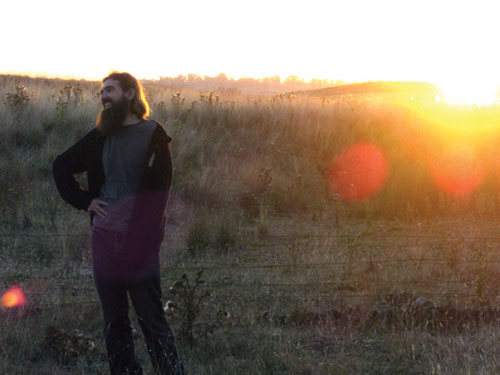Adam Mills runs the online label Sound & Fury out of his house in Nimmitabel, a small rural town of 300 on the way to the Snowy Mountains, in New South Wales. It’s a far cry from the shop’s previous location – a sprawling space on Bourke Street in inner city Sydney – but while the PO Box has changed, the focus remains: short-run, CD-R, DIY and private pressed music; lovingly hand printed, experimental indie fetishes. Think Seaworthy, Moonmilk and Shoeb Ahmad (profiled elsewhere in this issue), and Alps of New South Wales, among others. Adam threw his hat back into the retail game again recently, putting the call out for like minded artists and labels interested in Australian distribution through the online outlet. For issue 21, we asked Adam to take the Cyclic Selects challenge.

Castings – ‘Allo Hickory (CD-R, Spanish Magic, 2005)
Newcastle sextet Castings should be much, much bigger than they are. But for some reason – or combination of reasons – they’ve never achieved the widespread attention they so greatly deserve. Why is it that Wolf Eyes can grace the cover of The Wire, get signed to Sub Pop and perform on broadcast television in the States while Castings continue to toil in relative obscurity? It doesn’t seem right.
Too scuzzy to fit in amongst the more intellectual elements of Australia’s experimental community and too cerebral for the devil-may-care noise set, Castings have spent five or so years inhabiting their own no man’s land of foggy drone, deconstructed rock and pounding, industrialised rhythm. Less improvisational now than they once were, Castings have gradually shifted towards a more structured, visceral sound, as evidenced on their latest missive Punk Rock is Bunk Squawk. But it’s their second album ‘Allo Hickory, that I hold most dear.
Part of the reason for that is just a time and place thing: ‘Allo Hickory dates from the period when I first discovered Castings and was drawn into their world of under-the-radar gigs in decrepit Sydney warehouses. They were one of the first groups to throw their support behind sound&fury when it was an actual shop, accepting our humble invitation to play an instore with grace, and then allowing us to record it and put it out it as live at sound&fury, the label’s first release. Actually, it’s probably fair to say that without Castings, there wouldn’t be a label. So, thanks guys!
The North Sea – Crusades (CS, Digitalis Ltd, 2008)
Last year, Brad Rose laid his iconic CD-R imprint Foxglove to rest. The news of this left me feeling a strange combination of sadness and relief. It was a disappointing to see a label I’d followed so closely for so long close down; but at the same time, Foxglove’s prodigiously prolific release schedule had made keeping up with its discography an exceptionally taxing task, and the idea of a reprieve from that wasn’t entirely unwelcome.
So, of course, my feelings about Foxglove’s successor, the Digitalis Limited label, are similarly complex. That Rose has moved from CD-Rs to cassettes appeals to me greatly, given my stubborn, Luddite-esque refusal to accept the tape’s obsolescence. But by decreasing the edition sizes, he’s made it even harder for me to get my hands on a lot of these releases.
Crusades is the first Digitalis Limited tape from Rose’s solo project The North Sea. Previously a vehicle for his explorations of Appalachian folk music, Rose recently introduced The North Sea’s new guise as a noise/drone beast with the release of Mud Dragons (incidentally the last Foxglove release). The gritty, lo-fi tones, rumbling drones and oscillating electronics of Crusades perfectly suit the cassette format, embracing and absorbing the iconic hiss of the tape as another layer of noise.
It’s easy to romanticise the humble cassette; years spent making mixtapes as an adolescent have lent a hazy, nostalgic gauze to my thoughts on the format. I’m the first to admit that they’re far from perfect – each time I pop one into the stereo, a wave of fear washes over me as I imagine disentangling the tape’s mangled innards from the machine – but there’s something about the physicality of them that, for me, will always trump CD-Rs. I say that even as someone who runs a label that primarily releases CD-Rs, too.
Without wanting to seem like I’m jumping on some sort of bandwagon (because there has been an upswing in cassette releases over the last 18 months or so), I’ve actually given thought recently to switching from CD-Rs to tapes. In the early days of the label, CD-Rs were easy to produce and cheap as chips. They still are, but looking at something like Crusades, with its simple, hand-decorated J-card and clean, elegant black tape, makes me yearn for the format I grew up with. The jury’s still out on that one, for now. But don’t be surprised to see sound&fury tapes in the near future.
Tarentel – We Move Through Weather (CD, Temporary Residence, 2004)
I’ve always been amazed at how Tarentel’s growth as a band has mirrored the continual expansion of my musical tastes. When I first discovered them in the early days of this decade, they fell very much under the post-rock umbrella: long songs, loud/quiet dynamics, nods to Steve Reich and Glenn Branca. As someone who was just discovering the likes of Mogwai and Godspeed You! Black Emperor, you can see how this would have appealed to me.
As I was growing weary of those sounds (not that I don’t still have time for the likes of Explosions in the Sky or Mono), so too were Tarentel, apparently. Their second album The Order of Things saw them moving away from long, slow build-ups and glittering arpeggios and letting elements of drone and shoegazey psych bleed into the mix. By the time We Move Through Weather arrived in 2004 – at which time I was fully immersed in the worlds of noise, drone and improv. – this transformation was pretty much complete.
Most of the eight tracks on this album are too abstract to really be called songs. While there’s a strong rhythmic element to the record (thanks to Jim Redd’s at times This Heat-esque drum patterns), and there are shards of melody scattered throughout, We Move Through Weather sounds more like an edited down collection of free improvisations. Which, for the most part, it is.
A slew of EPs released in We Move Through Weather‘s wake have seen the band continue along their trajectory away from songwriting and structure. Paper White and Big Black Square collected the catchiest and darkest leftovers from the Weather sessions, respectively, while Home Ruckus sounds exactly how its title suggests. Ghetto Beats on the Surface of the Sun, a series of four 12″s released by The Music Fellowship and later collated across two sprawling CDs by Temporary Residence, is the most expansive representation of this; in a double-blind test, you’d be hard-pressed to pick it as being by the same band that recorded From Bone to Satellite in 1999. Which is a very good thing, of course.
Zelienople – Stone Academy (LP, Root Strata, 2005)
To stick with Tarentel for a moment, the only reason I heard them in the first place was because The Order of Things came out on Neurot Recordings, the label owned and operated by the members of San Franciscan post-metal juggernaut Neurosis. Having put all my trust into the group’s collective taste, I would buy any and every release the label put out, a policy which introduced me to the likes of Isis, Oxbow and KK Null, among others.
How this relates to Zelienople is that the only reason I heard them is because I adopted the same approach to Root Strata, a label started in 2005 by Tarentel’s Jefre Cantu-Ledesma, as I had Neurot. Root Strata’s initial triumvirate of Tarentel satellite projects – The Alps, The Holy See and Ledesma’s first solo release under his own name – were all fantastic, and with Ledesma’s taste in music having been proven to closely shadow my own over the past four years or so, I determined to follow him anywhere he chose to go.
Stone Academy, released in a limited run of 300 hand-numbered LPs, wasn’t actually the first time I heard Zelienople. I’d given their CD-R Ghost Ship/Mary Celeste a cursory listen earlier that year but (shamefully) written it off as just another drone release. So when Stone Academy came out, I wasn’t all that excited. I still bought it, though, based on the logic that if Ledesma liked these guys, maybe I should give them another go.
Imagine my surprise, then, when I put the record on and found that it wasn’t another collection of submarine drones but of actual songs, with words and tunes and choruses and everything. Well, actually, it’s a bit of both, but what immediately stood out to me was tracks like ‘More Mess’ and ‘Fuck Everything’, foggy, reverb-drenched pop songs with memorable hooks and laconic, distant-sounding vocals.
So my loyalty to the label paid off. Actually, it’s paid off several times over, having introduced me to Starving Weirdos, Bonus and John Davis as well. It’s an at times financially crippling enterprise, buying everything a label puts out even if you’ve never heard of the artist, but I’ve found it to be an investment that pays massive dividends in the long run.
Grouper – Dragging a Dead Deer up a Hill (LP, Type, 2008)
Grouper is Liz Harris, a Portland-based artist who crafts hauntingly intimate pop songs onto which she pours layers and layers of hiss and reverb, obfuscating the melodies to the point where they’re nothing but a faint glimmer beneath the fog.
That is, until Dragging a Dead Deer up a Hill came along. Stripping back the noise that had always been an integral factor to Grouper’s sound, Harris recast herself as a wistful folk singer. Though her enchanting mezzo soprano voice is still drenched in echo (like she refused to come within two feet of the microphone when recording her vocals), it’s right up front in the mix alongside breezily strummed acoustic guitars and tinkling pianos. It’s a far cry from the stormy sound of 2005’s Way Their Crept, but it’s a welcome development.
A conversation I had around the time of this album’s release ended with me wondering if Harris might continue to ‘clean up’ her sound, and in doing so end up sounding like Cat Power or something. It’s possible, and quite strange to consider. The songwriting nous is there, as is the uniquely affecting voice; but the idea of Liz Harris supporting Nick Cave or getting signed to Matador leaves me feeling slightly uncomfortable.
It’s a common reaction. When we discover an artist through ‘grassroots’ means, we tend to feel a stronger connection to them. We come to think of them as ‘ours’, in a sense. So naturally, the idea that they might be on the verge of achieving a higher level of fame diminishes that feeling somewhat. In a weird way, it’s almost like they’re cheating on you. Silly, yes, but still common.
I couldn’t possibly explore the complexities of this notion in less than 400 words. Suffice to say, if Grouper’s next album is Liz Harris’s Moon Pix, I’ll on one hand feel proud that she’s getting her incredible music out to a greater number of people – this stuff deserves to be heard, and shouldn’t be so jealously guarded by the underground/experimental elite – but can’t say I won’t miss the specialness of feeling that something – an artist, an album, a song – belongs almost exclusively to me.
Brothers of the Occult Sisterhood – Animal Speak (CD-R, musicyourmindwillloveyou, 2004)
I couldn’t make this list without giving a nod to Michael Donnelly and the musicyourmindwillloveyou collective. Based in the Northern Rivers town of Kyogle, their immense output of hand-packaged CD-Rs has had an immeasurable impact on the development of the psychedelic free-folk scene.
You might say that Brothers of the Occult Sisterhood is the flagship band of MYMWLY. Initially a duo consisting of Michael Donnelly with his sister Kristina, BOTOS has since metamorphosised into a sprawling ensemble with no fixed membership.
Animal Speak was the first recorded document of the duo’s activities to be released. Its combination of improvised cello and acoustic guitar, free-form percussive clatter and ritualistic vocals make listening to it feel akin to eavesdropping on some kind of private ceremony. There’s a magical, mystical element to BOTOS’s early music, and it’s at its most potent on Animal Speak.
Animal Speak also finds BOTOS at their most melodic and structured – these are the closest things to actual songs to be found in their sizable discography (15 releases and counting). Where recent offerings such as The World is at War and Statues from Space cultivated a much more abstract sound, tracks like ‘Om Agar’ and ‘Quetzacoatl’s Return’ sound at least semi-composed (or improvised in a much more lucid state than the hallucinogenic jams of, say, Chimes Against Reality).
Donnelly recently announced the closure of MYMWLY. His overflowing creativity will instead be poured into Pacific Soma, which promises CD releases in larger editions as well as limited vinyl releases. As long as some kind of ruckus continues to emanate from New South Wales’s far north (and wherever else Donnelly and his cohorts spread their tentacles), my ears will remain wide open.
Lasse Marhaug – Spaghetti Western Rainbow (CD-R, Utech Records, 2005)
Milwaukee label Utech Records’ impressive catalogue of improv. and noise discs was a huge inspiration in starting my own label. I could have quite easily chosen another of the first wave of CD-Rs – maybe Pipes and Bones, an incendiary drums/organ duo from Paal Nilssen-Love and Nils Henrick Asheim, or perhaps Steve Hubback’s solo percussion marathon Trees, Rocks and Ravens – but it’s Norwegian noise kingpin Lasse Marhaug’s tribute to Ennio Morricone’s Spaghetti Western Rainbow that I find myself reaching for more often than anything else.
Utech’s visual aesthetic makes clear the distinction between ‘handmade’ and ‘homemade’. Not to disparage DIY culture’s love affair with photocopiers and bond white paper, but there’s definitely something to be said for the simplistic elegance with which Keith Utech packages his releases. The first 20 or so CD-Rs on the label came housed in generic chipboard jackets, around the spine of which was glued a slip of coloured paper. The front of these slips of paper had a simply-designed artist/title motif and the relevant recording and copyright info; on the back was some kind of old-timey illustration (a bear, a straight razor, a tattooed man; on Spaghetti Western Rainbow, it’s a revolver). So professional does all of it seem that the only way to tell these aren’t pro-pressed CDs is to turn the discs themselves over to see the greenish tinge of the dye.
My other favourite thing about Utech’s packaging is its consistency, which has the effect of simultaneously making Utech’s catalogue a collector’s dream as well as a complete nightmare. Lined up on the shelf together, the matching spines look highly impressive. But, of course, that impressiveness requires unwavering fealty to the label. Sure, I mightn’t listen to Matt Lavelle’s Making Eye Contact with God with any great frequency, but I couldn’t very well have a gap between UR006 and UR008, could I? No, no I could not.
Sunn O))) – 00 Void (CD, Hydrahead, 2000)
Most albums on this list feature some element of drone. That’s not by design, it’s just that ‘the drone’ crops up with an almost alarming regularity within my listening habits. It’s there in the ragas and sagas of the Jewelled Antler Collective’s glistening free-folk; it’s there in the eerie field recordings on minimal modern classical stuff like Library Tapes and Deaf Center. Even the hisses and hums that underpin glitch and the constant open string in Johnny Cash’s finger picking are varieties of drone.
But few groups in the past decade have embraced the drone like Sunn O))). This Seattle duo took the drone-metal template established by fellow Seattle-ites Earth in the early ’90s – basically Black Sabbath riffs slowed to a prehistoric crawl and drowned in a tar pit of distortion and delay – and delivered it to the (relative) masses.
00 Void is the group’s purest statement. Where in later years they took an increasingly experimental approach to their drones (particularly on the iconic White1 and White2), this album is just riffs, reverb and endless delay. On the back of this record, Stephen O’Malley and Greg Anderson became drone’s willing poster children, simultaneously courting both the chin-stroking avant-garde set (who relished in drawing tenuous connections between the group’s slo-mo sludge and The Theater of Eternal Music) and the metal crowd (who just wanted to drift away on the band’s ocean of feedback). Their preference for high theatrics – stages wreathed in dense fog, a ‘uniform’ of monkish cloaks known as GrimmRobes – and their ability to collaborate effectively with a notably broad spectrum of artists (from black metal vocalist Attila Csihar and noise provocateur John Wiese to author/musician/occultist Julian Cope) ensured a great deal of public and media interest in the group. That the band’s live performances were usually preceded by a shock wave of rumour suggesting spontaneous regurgitation caused by their unbearable volume didn’t harm their profile either.
Sunn O))) haven’t maintained their greatness – to my ears, they peaked with this record and have since struggled to regain its intensity. But their role in fostering a widespread interest in the drone – and in turning me onto a tonne of incredible music, from Indian ragas to Boris – isn’t to be underestimated.
Earth – Hex; or Printing in the Infernal Method (CD, Southern Lord, 2006)
By the end of 2005, the whole drone-metal thing was in serious danger of stagnating. Sunn O))) seemed to be releasing a new limited edition this or that every other week, and save for a few notable exceptions (their Peel Session 12″, for example), it was all beginning to sound like static to my ears.
So while Stephen O’Malley and Greg Anderson fed into (or, more cynically, off) the growing popularity of American black metal by hooking up with misanthropes like Wrest and Malefic and fell to cheap gimmicks like recording vocal takes from inside a coffin (I kid you not), Dylan Carlson – the man without whom there would be no Sunn O))) – was quietly retooling Earth and preparing to launch a whole new phase in the band’s career.
Hex is a drone record, but not in the lumbering, mono-chordal way Earth 2 was. Its links to Carlsson’s early inspirations such as Black Sabbath and La Monte Young are minimal; rather, if Hex has anything in common with other artists, it’s Neil Young and Ry Cooder (in particular, their soundtracks to Dead Man and Paris, Texas respectively). On Hex, Carlson casts his own bleak vision of Americana; a sepia-toned collage of religious iconography and blood-stained superstition. Here, the drone inherent in Johnny Cash’s finger picking (as mentioned above) is writ large, the vastness of America’s colonial landscape captured in the long, shimmering decay of Carlson’s lonesome, bent notes. There’s a laidback ease to Hex (as well as its successors, Hibernaculum and The Bees Made Honey in the Lion’s Skull) that makes it a more satisfying listen than anything produced by the legions of slavering acolytes that follow in his wake, and re-establishes Carlson as America’s reigning master of the drone.
Skullflower – Exquisite Fucking Boredom (CD, Tumult, 2002)
Exquisite Fucking Boredom was a last minute addition to this list. When I sat down this morning to attempt to assemble my pages and pages of scrawled notes and ideas into something vaguely coherent, I pulled this CD from its box almost at random. I haven’t listened to it in months, perhaps years; had you asked me to hum the riff from ‘Celestial Highway’ (the epic four-part track that forms the bulk of the record) it would have been a struggle. It’s not an album that’s ever really received high rotation in my stereo; usually, I’ll listen to it once or twice and then forget it for months on end.
But having spent the last hour or so listening to it, I’m beginning to notice how much Exquisite Fucking Boredom prefigures a lot of my current tastes in music. I first heard Skullflower in – I think – 2003, after noticing that their name cropped up with alarming regularity in reviews for groups like Neurosis, Isis and Old Man Gloom. Intrigued by its title, I chose this album as my jumping-in point. And I hated it. The first 45 minutes are all based around the same loping, ’70s-style riff, and the last three tracks (collectively clocking in at around half an hour) were too abstract and spacey to really be called songs. How anybody could draw any sort of connection between this and something like Neurosis was beyond me. Boredom indeed.
But over time, as I every now and then gave the album the benefit of the doubt and listened to it again, Exquisite Fucking Boredom slowly grew on me. To the point where listening to it right now (it only just finished, after 75 minutes of kicking my skull – no pun intended – in), I’m tempted to label it an all-time classic. Its influence on the evolution of my musical tastes was never direct – I didn’t pay it nearly enough attention for that to be the case. But given my current (and admittedly recent) love of all things psych, prog, kraut, drone and noise, this album was there first. Now, I’m wondering if all the people raving (rightly so) about Wooden Shjips, Om and the like have heard this – if not, they really need to. Now. Because – yep, I’ve made up my mind on this – it’s an absolute classic.
More information at soundandfury.com.au.



